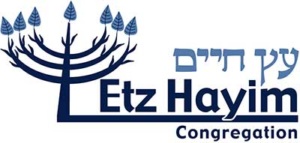Instructions for counting the omer are found on our Omer Overview Page. You can find the specific blessing for today at chabad.org.
We’re dedicating a new Sefer Torah on the first day of Shavuot. In honor of this joyous occasion, we’re using the counting of the Omer to take a whirlwind trip through the Torah
Today’s portion is Lech-Lecha from the book of Genesis. Today’s insight was generously provided by Nathan A.
Verses of note: Genesis 16:2 – 16:3 and also 12:2-3, 12:7, 13:15-17, 14:5, 15:7, 15:18-21
What caught your attention in this parashah?
I am currently watching the television show based on Margaret Atwood’s The Handmaids Tale so once I read lines 16:2 and 3 I could not help but think about these lines in their biblical and now dystopian fiction context. While they are not the biblical lines cited by Offred’s commander during “the ceremony”, the act described is the same. In only third parsha of the torah Abram is told to leave everyone and everything he has ever known, take all his possessions and move out on what’s basically a one-way ticket into the unknown. And he does this based only on promises and visions from G-d – six times in only three chapters (12:2-3, 12:7, 13:15-17, 14:5, 15:7, 15:18-2). Trusting in these visions, he leaves. But very soon he starts to lose faith since he does not even have one child and uses Hagar as his handmaid.
What’s one explanation for these verses?
The four lessons I took away from this review – and a final summary of them:
1) Be willing and have the strength to make changes. Change is scary and unpredictable. Don’t let the fear of the unknown bind you to a less-than-desirable status quo. As the torah commands – justice, justice, shall thou pursue. Don’t let the fear stop you from pursuing this. Have faith and trust and be willing to act on this trust and faith. In general things will work out. As the father of an Isaac who was born to me and my wife late in our lives we can empathize with the feelings of Abram and his desire to have progeny and his questioning.
2) Do not be a passive observer in making these changes – be an active participant. Abram did not just sit back and let himself become the father of a great nation – he had to take decisive action all along.
3) Be active but don’t go overboard. Abram and Sarai became impatient about becoming parents and seemed to lose their faith in G-d’s vision and took action into their own hands with Hagar. And look at the strife that this action created. Keep up the faith and continue on the path but also be patient.
4) Invoking the Handmaid’s Tale I can’t help but think that a caveat of not going overboard also extends to faith and trust in G-d’s vision. Faith and a holy vision can be wonderful, motivating things but mankind’s greed and self-centered nature can turn what are usually positive elements into their own evil purposes as one bible quote was used in the novel to subjugate women.
The overall message that I take from these four points is to have faith and trust in G-d’s message. Act on this faith and vision and have patience. And temper your actions of these with compassion and understanding for others without losing rationality.


